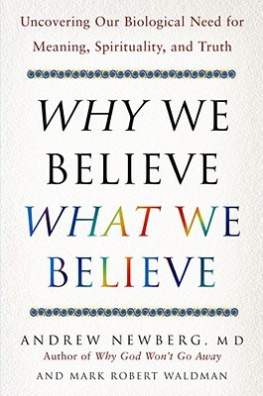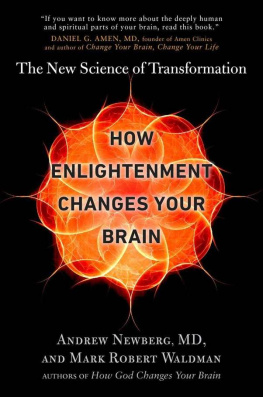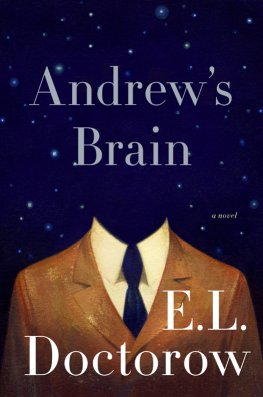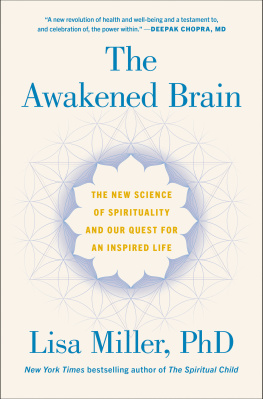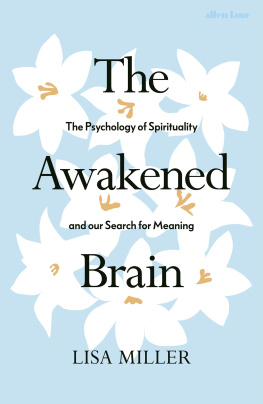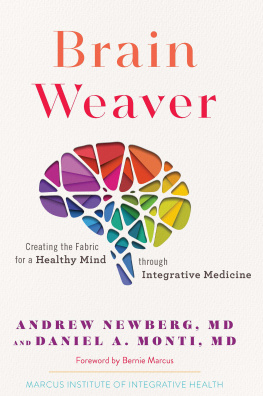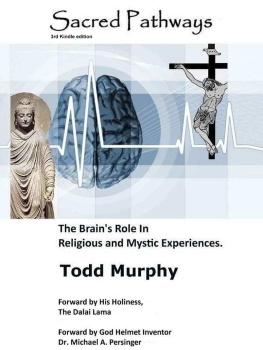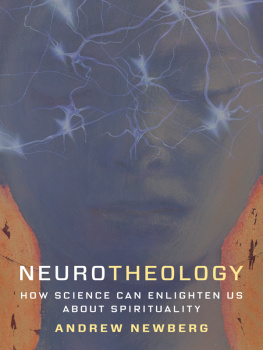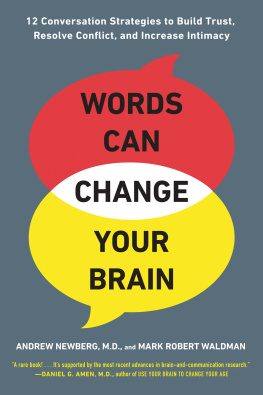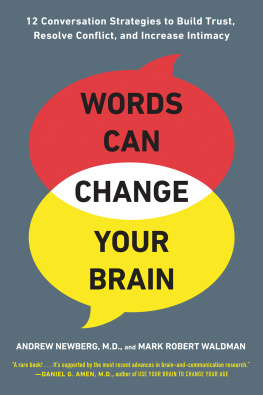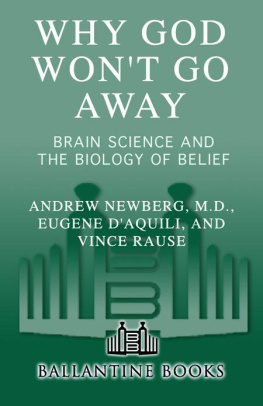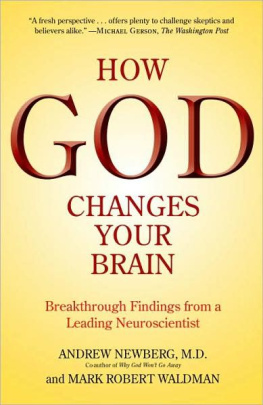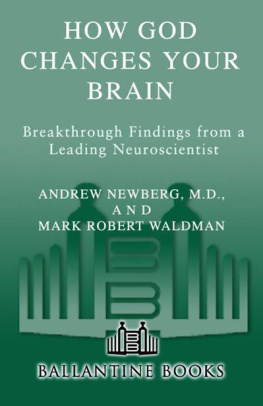
A LSO BY A NDREW N EWBERG , MD
Why God Wont Go Away: Brain Science and the Biology of Belief
(with Eugene DAquili, MD, PhD, and Vince Rause)
The Mystical Mind: Probing the Biology of Religious Experience
(with Eugene DAquili, MD, PhD)
A LSO BY M ARK R OBERT W ALDMAN
The Art of Staying Together
The Spirit of Writing: Classic and Contemporary Essays
Celebrating the Writing Life
Dreamscaping (with Stanley Krippner, PhD)
Love Games: How to Deepen Communication, Resolve Conflict,
and Discover Who Your Partner Really Is
Archetypes of the Collective Unconscious, vols. 14
(Shadow, Seeker, Lover, and Healer)

FREE PRESS
A Division of Simon & Schuster, Inc.
1230 Avenue of the Americas
New York, NY 10020
Copyright 2006 by Andrew Newberg, MD, and Mark Robert Waldman
All rights reserved, including the right of reproduction in whole or in part in any form.
F REE P RESS and colophon are trademarks of Simon & Schuster, Inc.
Library of Congress Cataloging-in-Publication Data
Newberg, Andrew B.
Why we believe what we believe: Uncovering our biological need for meaning, spirituality, and truth/Andrew Newberg, Mark Robert Waldman.
p. cm.
Includes bibliographical references.
1. Psychology, Religious. 2. BrainReligious aspects.
I. Waldman, Mark Robert. II. Title.
BL53.N49 2006
153.4dc22 2006048274
ISBN: 0-7432-9372-X
Visit us on the World Wide Web:
http://www.SimonSays.com
To Gene dAquili
and Jeremy Tarcher
for their vision, friendship, and relentless search for the truth.
And to our wives, Stephanie and Susan,
who stand by us night and day.
Contents
Part I
How the Brain Makes Our Reality
Chapter 1
The Power of Belief
M R . W RIGHT WASN T EXPECTED TO LIVE THROUGH THE night. His body was riddled with tumors, his liver and spleen were enlarged, his lungs were filled with fluid, and he needed an oxygen mask to breathe. But when Mr. Wright heard that his doctor was conducting cancer research with a new drug called Krebiozen, which the media were touting as a potential miracle cure, he pleaded to be given treatments. Although it was against protocol, Dr. Klopfer honored Mr. Wrights request by giving him an injection of the drug, then left the hospital for the weekend, never expecting to see his patient again. But when he returned on Monday morning, he discovered that Mr. Wrights tumors had shrunk to half their original size, something that even radiation treatments could not have accomplished.
Good God! thought Dr. Klopfer. Have we finally found the silver bulleta cure for cancer? Unfortunately, an examination of the other test patients showed no changes at all. Only Mr. Wright had improved. Was this a rare case of spontaneous remission, or was some other unidentified mechanism at work? The doctor continued to give injections to his recovering patient, and after ten days practically all signs of the disease had disappeared. Wright returned home, in perfect health.
Two months later, the Food and Drug Administration reported that the experiments with Krebiozen were proving ineffective. Mr. Wright heard about the reports and immediately became ill. His tumors returned, and he was readmitted to the hospital. Now, Dr. Klopfer was convinced that the patients belief in the drugs effectiveness had originally healed him. To test his theory, he decided to lie, telling Mr. Wright about a new, super-refined, double-strength product that was guaranteed to produce better results. Mr. Wright agreed to try this new version of what he believed had healed his tumors before, but in reality, Dr. Klopfer gave him injections of sterile water.
Once again, Mr. Wrights recovery was dramatic. His tumors disappeared, and he resumed his normal lifeuntil the newspapers published an announcement by the American Medical Association under the headline Nationwide Tests Show Krebiozen to Be a Worthless Drug in Treatment of Cancer.
After reading this, Mr. Wright fell ill again, returned to the hospital, and died two days later. In a report published in the Journal of Projective Techniques, Dr. Klopfer concluded that when the power of Wrights optimistic beliefs expired, his resistance to the disease expired as well.1
Each year, thousands of cases of remarkable recoveries are described, and although such miracles are often attributed to the power of faith and belief, the majority of scientists are skeptical of such claims. In the medical literature, spontaneous remissionsat least when cancer is involvedare extremely rare. Estimates range from one case in 60,000 to one in 100,000, although a definitive overview of the topic2 argues that perhaps one patient in 3,000 experiences a spontaneous remission. Moreover, the majority of oncologists believe that an unidentified biological mechanism is at work rather than a true miracle3; and current hypotheses favor alterations in the bodys cellular, immunological, hormonal, and genetic functioning over psychological mechanisms.4 But Mr. Wrights case is uniqueand one of the few to be documented during a university research project. The remissions of his cancer have been attributed to the effects of his mind on the biological functioning of his bodyin other words, on the biology of belief.
Hundreds of mind-body experiments have been conductedincluding placebo studies and research on the power of meditation and prayerbut few scientists have attempted to explain the underlying biology of belief. We have volumes of comprehensive statistics about the kinds of beliefs we hold, but our understanding of how and why belief works is still in its infancy, and most conclusions are still controversial.
Fortunately, recent discoveries about the ways the brain creates memories, thoughts, behaviors, and emotions can provide a new template with which to examine the how and why of belief. What I will propose in this book is a practical model of how the brain works that will help you understand your own beliefs and the nature of reality. It will also help you see how all beliefs emerge from the perceptual processes of the brain, and how they are shaped by personal relationships, societal influences, and educational and spiritual pursuits. This understanding can then help us to discern the difference between destructive and constructive beliefs, skills that are essential if we are to adequately address important individual, interpersonal, and global problems.
Beliefs govern nearly every aspect of our lives. They tell us how to pray and how to vote, whom to trust and whom to avoid; and they shape our personal behaviors and spiritual ethics throughout life. But once our beliefs are established, we rarely challenge their validity, even when faced with contradictory evidence. Thus, when we encounter others who appear to hold differing beliefs, we tend to dismiss or disparage them. Furthermore, we have a knee-jerk tendency to reject others who are not members of our own group. Even when their belief systems are fundamentally similar to ours, we still feel that they are significantly different. For example, Christianity, Judaism, and Islam all embrace similar notions of God,5 yet according to one poll nearly one-third of Americans believe that each of these religious groups worships a different deity.6 Even though a close investigation of the worlds religions will show that the majority of human beings share similar ethical values, we tend to ignore the similarities and focus on the discrepancies. Ignorance is only partly to blame. A more significant reason is that our brains are instinctually prone to reject information that does not conform to our prior experience and knowledge. Simply put, old beliefs, like habits, die hard.

